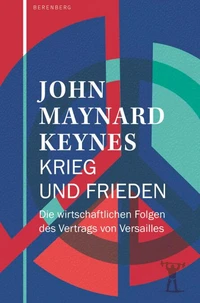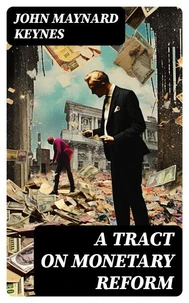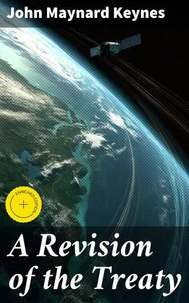A Tract on Monetary Reform. Unveiling the Economic Path: Insights into Monetary Policy and Financial Reform
Par :Formats :
Disponible dans votre compte client Decitre ou Furet du Nord dès validation de votre commande. Le format ePub est :
- Compatible avec une lecture sur My Vivlio (smartphone, tablette, ordinateur)
- Compatible avec une lecture sur liseuses Vivlio
- Pour les liseuses autres que Vivlio, vous devez utiliser le logiciel Adobe Digital Edition. Non compatible avec la lecture sur les liseuses Kindle, Remarkable et Sony
 , qui est-ce ?
, qui est-ce ?Notre partenaire de plateforme de lecture numérique où vous retrouverez l'ensemble de vos ebooks gratuitement
Pour en savoir plus sur nos ebooks, consultez notre aide en ligne ici
- Nombre de pages139
- FormatePub
- ISBN406-633--806143-0
- EAN4066338061430
- Date de parution05/11/2021
- Protection num.Digital Watermarking
- Taille1 Mo
- Infos supplémentairesepub
- ÉditeurGOOD PRESS
Résumé
In "A Tract on Monetary Reform, " John Maynard Keynes articulates a comprehensive critique of the monetary system prevalent in the early 20th century, advocating for radical reforms to enhance its functionality and stability. Keynes employs a clear and engaging prose style, blending analytical rigor with accessible language, allowing complex economic theories to be comprehensible to a broader audience.
Set against the backdrop of the post-World War I economic turmoil, this work contextualizes the deficiencies of the gold standard and proposes the establishment of a more flexible monetary framework to mitigate the cyclical crises that plagued economies during that era. John Maynard Keynes, a prominent British economist, is revered as the father of modern macroeconomics. His experiences during the interwar period, marked by rampant inflation and unemployment, deeply influenced his thinking and ultimately led him to challenge classical economic theories.
Keynes's scholarly background, combined with a keen awareness of socio-political issues, drove him to advocate for innovative monetary solutions aimed at ensuring economic stability and promoting growth. Readers interested in understanding the foundational ideas that shaped modern economic thought will find "A Tract on Monetary Reform" to be indispensable. Keynes's insightful analysis and visionary proposals remain relevant today, making this work a crucial resource for economists, policymakers, and anyone seeking to grasp the complexities of monetary theory and its real-world implications.
Set against the backdrop of the post-World War I economic turmoil, this work contextualizes the deficiencies of the gold standard and proposes the establishment of a more flexible monetary framework to mitigate the cyclical crises that plagued economies during that era. John Maynard Keynes, a prominent British economist, is revered as the father of modern macroeconomics. His experiences during the interwar period, marked by rampant inflation and unemployment, deeply influenced his thinking and ultimately led him to challenge classical economic theories.
Keynes's scholarly background, combined with a keen awareness of socio-political issues, drove him to advocate for innovative monetary solutions aimed at ensuring economic stability and promoting growth. Readers interested in understanding the foundational ideas that shaped modern economic thought will find "A Tract on Monetary Reform" to be indispensable. Keynes's insightful analysis and visionary proposals remain relevant today, making this work a crucial resource for economists, policymakers, and anyone seeking to grasp the complexities of monetary theory and its real-world implications.
In "A Tract on Monetary Reform, " John Maynard Keynes articulates a comprehensive critique of the monetary system prevalent in the early 20th century, advocating for radical reforms to enhance its functionality and stability. Keynes employs a clear and engaging prose style, blending analytical rigor with accessible language, allowing complex economic theories to be comprehensible to a broader audience.
Set against the backdrop of the post-World War I economic turmoil, this work contextualizes the deficiencies of the gold standard and proposes the establishment of a more flexible monetary framework to mitigate the cyclical crises that plagued economies during that era. John Maynard Keynes, a prominent British economist, is revered as the father of modern macroeconomics. His experiences during the interwar period, marked by rampant inflation and unemployment, deeply influenced his thinking and ultimately led him to challenge classical economic theories.
Keynes's scholarly background, combined with a keen awareness of socio-political issues, drove him to advocate for innovative monetary solutions aimed at ensuring economic stability and promoting growth. Readers interested in understanding the foundational ideas that shaped modern economic thought will find "A Tract on Monetary Reform" to be indispensable. Keynes's insightful analysis and visionary proposals remain relevant today, making this work a crucial resource for economists, policymakers, and anyone seeking to grasp the complexities of monetary theory and its real-world implications.
Set against the backdrop of the post-World War I economic turmoil, this work contextualizes the deficiencies of the gold standard and proposes the establishment of a more flexible monetary framework to mitigate the cyclical crises that plagued economies during that era. John Maynard Keynes, a prominent British economist, is revered as the father of modern macroeconomics. His experiences during the interwar period, marked by rampant inflation and unemployment, deeply influenced his thinking and ultimately led him to challenge classical economic theories.
Keynes's scholarly background, combined with a keen awareness of socio-political issues, drove him to advocate for innovative monetary solutions aimed at ensuring economic stability and promoting growth. Readers interested in understanding the foundational ideas that shaped modern economic thought will find "A Tract on Monetary Reform" to be indispensable. Keynes's insightful analysis and visionary proposals remain relevant today, making this work a crucial resource for economists, policymakers, and anyone seeking to grasp the complexities of monetary theory and its real-world implications.







![Das Ende des Laissez-faire. Mit einem Essay von Nikolaus Piper. [Was bedeutet das alles?]](https://products-images.di-static.com/image/john-maynard-keynes-das-ende-des-laissez-faire/9783159616988-200x303-1.webp)

